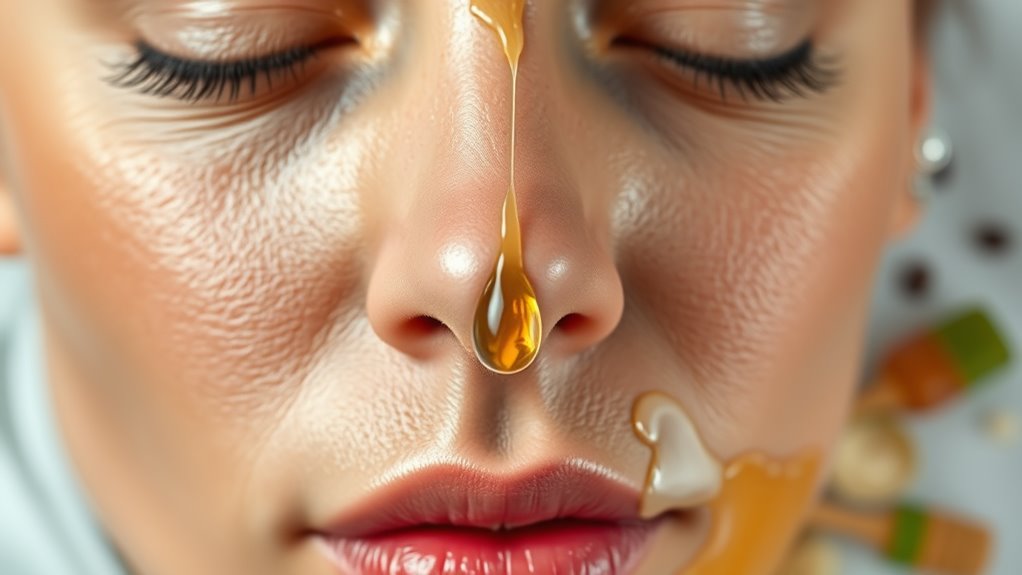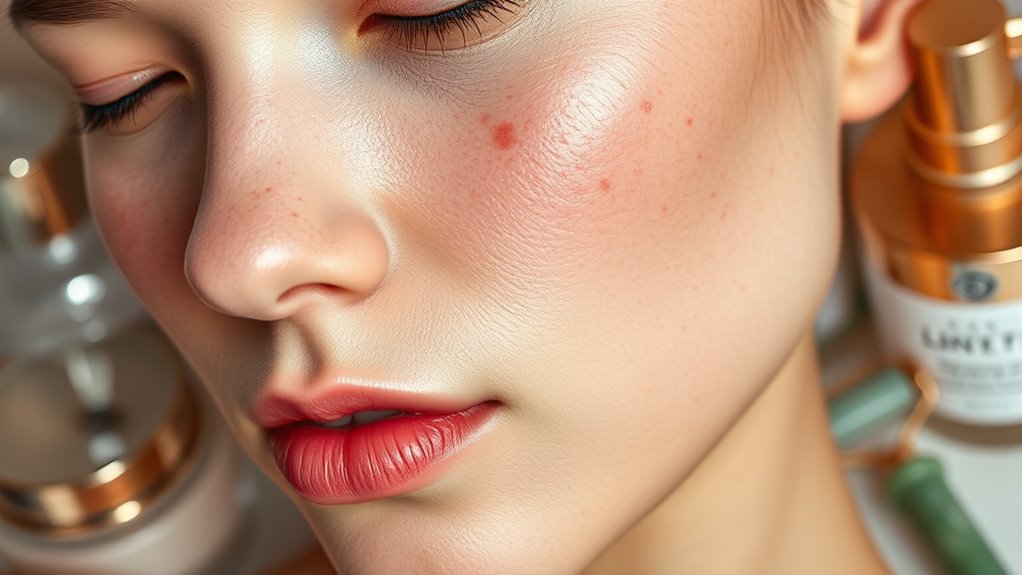This Is the Real Reason You Have Dry Patches
Dry patches on your skin often stem from a combination of environmental factors, skin conditions, and lifestyle choices that compromise moisture retention. Low humidity, harsh chemicals, and extreme temperatures can all contribute to dryness. Conditions like eczema and psoriasis further irritate your skin, leading to flaky patches. Additionally, inadequate hydration and poor diet worsen the situation. Understanding these causes can help you address dry patches effectively, revealing further insights into maintaining skin health.
Key Takeaways
- Genetic predispositions and skin barrier dysfunction are common causes of dry skin patches.
- Environmental factors like low humidity and harsh chemicals can exacerbate dryness.
- Nutritional deficiencies, particularly in vitamins A, E, and essential fatty acids, contribute to skin dryness.
- Skin conditions such as eczema, psoriasis, and fungal infections often present as dry patches.
- Inadequate hydration and an improper skincare routine can lead to persistent dryness.
Understanding Dry Skin Patches
When you notice dry skin patches, it’s essential to understand their underlying causes. Various factors contribute to these conditions, including genetic predispositions, skin barrier dysfunction, and dehydration.
For instance, conditions like eczema or psoriasis can lead to chronic dry skin patches, resulting from inflammatory responses that disrupt skin integrity. Additionally, certain medical conditions, such as hypothyroidism or diabetes, may impair skin hydration.
Nutritional deficiencies, particularly in vitamins A, E, and essential fatty acids, can also exacerbate the issue. Furthermore, certain medications might induce dryness as a side effect. Environmental factors such as low humidity or exposure to harsh chemicals can significantly worsen dry skin conditions.
Identifying the specific dry skin patches causes is crucial for effective treatment and management strategies tailored to your unique skin needs.
Environmental Factors Contributing to Dryness
Understanding the underlying causes of dry skin patches lays the groundwork for recognizing how environmental factors can further exacerbate these issues. Elements such as humidity, temperature, and pollution play significant roles in skin hydration. To maintain skin health during the winter, make essential skincare swaps that enhance your routine, ensuring your skin stays hydrated, protected, and radiant amidst the harsh cold.
| Environmental Factor | Impact on Skin Dryness |
|---|---|
| Low Humidity | Reduces moisture retention |
| High Temperatures | Increases sweat evaporation |
| Cold Weather | Constricts blood vessels, reducing moisture |
| Sun Exposure | Causes dehydration and damage |
| Pollution | Contributes to barrier dysfunction |
Common Skin Conditions That Cause Dry Patches
When you experience dry patches on your skin, it may be due to common conditions like eczema, dermatitis, psoriasis, or fungal infections.
Each of these conditions presents unique symptoms and requires specific treatment approaches. Understanding these skin issues can help you manage and alleviate dryness effectively. Additionally, recognizing the signs of sensitive skin symptoms can further assist in determining the right care for your skin.
Eczema and Dermatitis
Eczema and dermatitis are prevalent skin conditions that often lead to dry patches, causing discomfort and irritation. These conditions manifest as inflammation, redness, and flaking skin, resulting from a compromised skin barrier.
You may experience triggers such as allergens, irritants, or stress that exacerbate symptoms. Identifying your specific triggers is crucial for effective management.
Treatment typically involves topical corticosteroids to reduce inflammation and moisturizers to restore hydration. Daily skin care routines that emphasize gentle cleansing and regular moisturizing can help maintain skin integrity.
If over-the-counter options aren’t effective, consult a healthcare professional for potential prescription therapies or further diagnostic evaluation. Understanding the underlying causes of eczema and dermatitis empowers you to take proactive steps in managing these conditions effectively.
Psoriasis and Fungal Infections
While eczema and dermatitis are common culprits behind dry patches, psoriasis and fungal infections also play significant roles in skin health.
Psoriasis is an autoimmune condition characterized by rapid skin cell turnover, leading to thick, scaly patches that often feel dry and itchy. These patches can appear anywhere on the body and may be accompanied by inflammation.
Fungal infections, such as tinea, thrive in warm, moist environments and can cause dry, flaky patches that may resemble psoriasis. Identifying the specific type of fungal infection is crucial for effective treatment.
Both conditions require targeted therapies—topical steroids for psoriasis and antifungal agents for fungal infections. Understanding these differences is key to managing your skin health effectively.
The Role of Hydration in Skin Health
Hydration plays a crucial role in maintaining skin health, as it directly affects the skin’s barrier function and overall appearance. When your skin is adequately hydrated, it retains moisture effectively, preventing dryness and flakiness.
Insufficient hydration compromises the skin barrier, leading to increased transepidermal water loss, which can exacerbate conditions like eczema and dermatitis. Additionally, well-hydrated skin appears plumper and more elastic, reducing the visibility of fine lines and wrinkles.
To enhance your skin’s hydration, consider using moisturizers containing hyaluronic acid or glycerin, which attract and retain moisture. Drinking sufficient water also supports cellular function and helps maintain skin suppleness. Regularly applying moisturizers for hydration can significantly improve your skin’s overall moisture levels.
Prioritizing hydration is essential for achieving optimal skin health and preventing the discomfort of dry patches.
Impact of Diet on Skin Moisture Levels
Your diet significantly influences your skin’s moisture levels. Consuming essential fatty acids can enhance hydration, while high sugar intake may lead to dryness. Understanding these dietary impacts is crucial for maintaining optimal skin health. Foods rich in essential fatty acids can help improve your skin’s hydration and overall appearance.
Hydration and Skin Health
Diet plays a crucial role in maintaining skin moisture levels, as the nutrients you consume directly impact your body’s hydration status. A balanced diet rich in vitamins, minerals, and antioxidants ensures your skin remains supple and hydrated. Dehydration, often stemming from inadequate nutrient intake, can lead to dry patches and impaired skin barrier function.
| Nutrient | Function | Sources |
|---|---|---|
| Vitamin A | Promotes skin cell turnover | Carrots, sweet potatoes |
| Vitamin E | Protects from oxidative stress | Nuts, spinach |
| Zinc | Supports skin healing | Meat, legumes |
Incorporating these nutrients into your daily regimen can significantly enhance your skin’s hydration and overall health. Prioritize hydration for optimal skin vitality.
Essential Fatty Acids
Essential fatty acids (EFAs) play a vital role in maintaining skin moisture levels and overall skin health.
These polyunsaturated fats, particularly omega-3 and omega-6 fatty acids, are essential because your body can’t produce them. They contribute to the integrity of the skin barrier, reducing transepidermal water loss and enhancing hydration.
Incorporating EFAs into your diet can significantly improve skin texture and resilience. Sources include fatty fish, flaxseeds, walnuts, and avocados.
A balanced intake of these nutrients promotes optimal skin function and helps to prevent dryness and irritation. To achieve mastery in skin health, prioritize these fatty acids in your dietary choices, ensuring you nourish your skin from within for lasting hydration and vitality.
Sugar’s Drying Effects
While incorporating essential fatty acids can enhance skin hydration, it’s important to consider how sugar consumption might counteract these benefits.
High sugar intake can lead to glycation, a process where sugar molecules bind to proteins, including collagen and elastin. This damages skin structure, resulting in decreased moisture retention and increased dryness.
Moreover, sugar can trigger inflammation, exacerbating conditions like eczema and psoriasis, which may manifest as dry patches.
By promoting insulin spikes, excessive sugar can also disrupt hormonal balance, affecting oil production and leading to further dehydration.
To optimize your skin’s moisture levels, it’s crucial to limit sugar in your diet, allowing your skin to benefit fully from the hydration-enhancing properties of essential fatty acids.
Seasonal Changes and Their Effect on Skin
As the seasons shift, your skin can experience significant changes that may lead to dryness and irritation.
During colder months, lower humidity levels can strip moisture from your skin, weakening its barrier function. In contrast, summer heat may cause excessive sweating, leading to dehydration and an imbalance in your skin’s natural oils.
Additionally, fluctuations in temperature can trigger inflammation, exacerbating conditions like eczema or psoriasis. You might notice that products you relied on in one season are ineffective in another, necessitating adjustments to your regimen.
Understanding these seasonal impacts allows you to anticipate your skin’s needs, ensuring it remains hydrated and resilient throughout the year. Recognizing these patterns is essential for maintaining optimal skin health.
The Importance of Proper Skincare Routine
A proper skincare routine is crucial for maintaining healthy skin, especially when faced with environmental changes and varying skin conditions. Consistency in your regimen ensures your skin receives essential nutrients and hydration, preventing dryness and irritation.
Start with a gentle cleanser to remove impurities without stripping natural oils. Follow with a targeted treatment, such as serums containing hyaluronic acid or antioxidants, to address specific concerns.
Moisturizing daily locks in moisture and strengthens the skin barrier. Don’t forget sunscreen; UV exposure can exacerbate dryness and damage skin integrity.
Adapt your routine seasonally, adjusting products to meet your skin’s evolving needs. Mastering these principles enables you to maintain optimal skin health, minimizing the risk of dry patches and other complications.
Lifestyle Choices That Lead to Dry Skin
Many lifestyle choices can significantly contribute to dry skin, impacting your overall skin health.
Inadequate hydration is a primary factor; not drinking enough water can lead to dehydration and, subsequently, dry patches.
Excessive sun exposure without protection also exacerbates skin dryness, damaging the skin barrier. Similarly, frequent use of harsh soaps or alcohol-based products strips natural oils, leaving skin parched.
Additionally, living in low-humidity environments or using heating systems can further deplete moisture.
Poor dietary choices, particularly low intake of essential fatty acids, can weaken skin’s lipid barrier, reducing its ability to retain hydration.
Lastly, stress can trigger inflammatory responses, worsening skin conditions.
Addressing these lifestyle factors can significantly improve your skin’s moisture levels and overall appearance.
When to Seek Professional Help for Dry Patches
When should you consider seeking professional help for persistent dry patches on your skin? If your dry patches last longer than two weeks despite consistent hydration and moisturizing, it’s time to consult a dermatologist.
Additionally, seek assistance if you notice redness, swelling, or if the patches itch, bleed, or develop crusting. These symptoms may indicate an underlying condition such as eczema, psoriasis, or an allergic reaction that requires specialized treatment.
If over-the-counter remedies fail to improve your skin’s condition, professional evaluation is essential. Early intervention can prevent further complications and promote effective management of skin health.
Trust your instincts; if something feels off, prioritizing your skin’s well-being is crucial. Don’t hesitate to reach out for expert advice.




